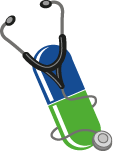Key messages for clinical microbiologists
Key messages for clinical microbiologists
English (93.6 KB - PDF)Tasks
1. Your tasks related to improving antibiotic use include [31,98-100] [expert consensus]:
a) Participating in the antibiotic stewardship team, as a key member of the team;
b) Collaborating with the infectious disease specialist and the hospital pharmacist to implement the antibiotic stewardship programme;
c) Supporting evidence-based hospital antibiotic guidelines for common infections and for surgical prophylaxis;
d) Timely identification and reporting of microorganisms (e.g. in blood cultures) and antimicrobial susceptibility testing;
e) Communicating critical results promptly to the treating physician;
f) Presenting data in a way that supports prudent antibiotic use, for example by selectively reporting to physicians a limited number of antimicrobial susceptibility results;
g) Providing guidelines for appropriate specimen collection, enforcing rejection criteria for specimens submitted inappropriately, and establishing procedures to limit the work-up of contaminants (e.g. blood cultures);
h) Guiding empirical antibiotic therapy by providing hospital and ward specific (e.g. intensive care unit or emergency department) cumulative antimicrobial susceptibility data;
i) Identifying critical trends in antibiotic resistance in the hospital and promptly communicating observations to the antibiotic stewardship team and the infection control team.
j) Managing your hospital’s antimicrobial formulary (i.e., list of drugs available for prescribers).
Things you can do, or collaborate on
2. Provide guidelines for specimen collection, storage and transport [98,99].
3. Ensure that laboratory testing and antimicrobial susceptibility reporting follow treatment guidelines (including selective reporting), and include relevant comments on interpretation if needed [31].
4. Ensure that identification and antimicrobial susceptibility testing results are communicated to prescribers, nurses and the antibiotic stewardship team especially for critical results (e.g. blood cultures) [98-100].
5. Ensure that testing and reporting of microbiology results follow European and national standards (i.e. European Committee on Antimicrobial Susceptibility Testing - EUCAST) [31].
6. Provide data on antibiotic resistance at hospital level and ward level, and communicate trends to the antibiotic stewardship team and the infection prevention and control team [101].
7. Train hospital prescribers regularly on antibiotic resistance, and on use of rapid and point-of-care diagnostic tests [31,53].
Share this page
